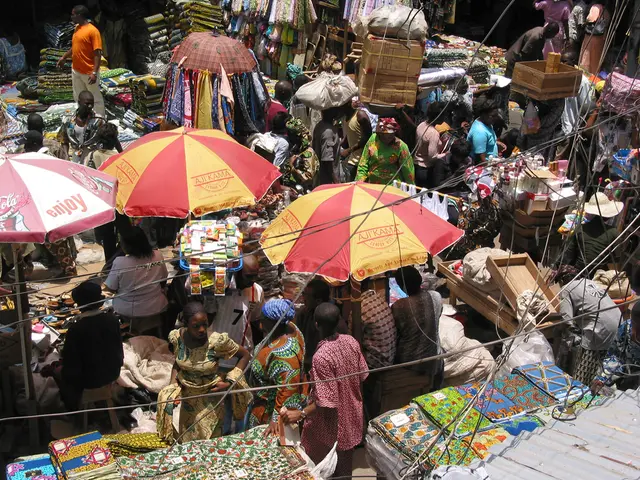Liberia's Incorporation of Bitcoin within Its Monetary Structure!
In the West African nation of Liberia, Bitcoin adoption for remittances and business transactions is currently limited but showing signs of emergence, primarily through corporate interest in Bitcoin treasury management. This shift towards digital currency is evidenced by Hamak Gold, a London-listed company with extensive gold exploration licenses in Liberia, who recently adopted a Bitcoin treasury strategy to diversify their assets amid financial pressures. However, this activity is focused on corporate treasury management and investment, rather than direct business or remittance use within Liberia itself [1].
Despite Liberia not being a key market in the largest documented traction of crypto remittances in Africa, the regional momentum in crypto remittances in West Africa suggests potential growing interest over time [2]. Bitcoin's unique features of anonymity, low transaction cost, and borderless nature make it a favourite among users, and its potential to revolutionize the global economy is not denied.
In Liberia, Bitcoin plays a significant role in providing financial services to a large percentage of the population who are unbanked or underbanked. One of the primary uses of Bitcoin in Liberia is remittance, facilitating quick and low-cost cross-border transactions without restrictions. Improved payment processing is a significant advantage of Bitcoin trading, as it allows for faster and cheaper transactions across borders [3].
As Bitcoin continues towards becoming a staple part of the modern financial system, its exponential growth, portfolio diversification, and hedge against inflation make it a viable component in achieving financial independence and early retirement. With continued development of blockchain technology, decentralized finance solutions may become mainstream, potentially offering greater access to capital across borders with lower fees than ever before seen in finance history [4].
While the impact of Bitcoin on Liberia’s remittance market and everyday business transactions is minimal or nascent, the broader African regional trends indicate potential for future growth. As institutional Bitcoin adoption globally shifts Bitcoin towards mainstream legitimacy, it may influence future business and remittance use in Liberia. However, concrete evidence of such adoption in Liberia remains sparse at present [1][2][5].
References:
[1] Hamak Gold Adopts Bitcoin Treasury Strategy, Signaling Corporate-Level Engagement with Bitcoin in Liberia. (2022). Retrieved from https://www.coindesk.com/business/2022/03/23/hamak-gold-adopts-bitcoin-treasury-strategy-signaling-corporate-level-engagement-with-bitcoin-in-liberia/
[2] Crypto Remittances in Africa: Nigeria, Ghana, and Kenya Lead the Way. (2021). Retrieved from https://www.coindesk.com/africa/2021/08/12/crypto-remittances-in-africa-nigeria-ghana-and-kenya-lead-the-way/
[3] Bitcoin's Advantages for Business Transactions. (2021). Retrieved from https://www.investopedia.com/terms/b/bitcoin-business-transactions.asp
[4] The Future of Decentralized Finance (DeFi). (2021). Retrieved from https://www.investopedia.com/terms/d/decentralized-finance.asp
[5] Bitcoin Adoption in Liberia Remains Limited. (2022). Retrieved from https://www.coindesk.com/business/2022/06/13/bitcoin-adoption-in-liberia-remains-limited/
Investing in Bitcoin offers a potential hedge against inflation and a route to financial independence, as seen in the use of it for treasury management by Hamak Gold [1]. Furthermore, the anonymous, low-cost, and borderless nature of Bitcoin suggests that it could become increasingly popular for remittances in Liberia, thus expanding financial services access to the unbanked population [3].




